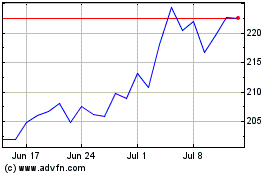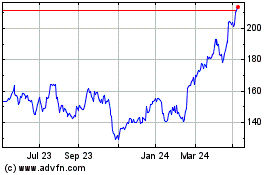RBS Must Add $2.5 Billion in Capital After Failing BOE Stress Test --2nd Update
November 30 2016 - 5:13AM
Dow Jones News
By Margot Patrick and Max Colchester
LONDON-- Royal Bank of Scotland Group PLC must add around GBP2
billion ($2.5 billion) in capital after failing a Bank of England
stress test Wednesday, sending its shares down 4%.
The annual health checks also exposed weaknesses at two other
banks, Barclays PLC and Standard Chartered PLC, but neither bank
needs to change its capital plans.
The central bank said overall the U.K.'s banking system is in
strong shape and could still keep lending to businesses and
households even under a five-year scenario of economic turmoil
roughly akin to the financial crisis. The hypothetical scenario for
the test, issued last March, didn't cover the impact of Britain
leaving the European Union, but the results gave a snapshot of how
the country's banks would fare in a severe U.K. recession.
The annual tests measure the health of seven lenders--RBS,
Barclays, Standard Chartered, HSBC Holdings PLC, Lloyds Banking
Group PLC, Santander U.K. and Nationwide Building Society. The
scenarios change each year and provide a road map for British
banks' capital plans, including their ability to pay dividends.
They are watched by analysts and investors, but so far haven't
taken on the significance of similar annual tests of big banks by
the Federal Reserve.
RBS, still 73%-government owned since bailouts in 2008 and 2009,
will outline a new strategic plan early next year as it continues
to face headwinds from low interest rates and potentially vast
fines from U.S. authorities over the sale of toxic mortgage-backed
securities. The plan should raise more than the GBP2 billion
capital shortfall identified by the Bank of England.
On Wednesday, RBS said that it would further cut costs and
assets to meet regulatory requirements. However, the bank warned
that "additional management actions may be required until RBS's
balance sheet is sufficiently resilient to stressed scenarios."
The results are another blow to RBS, which is already wading
through a vast restructuring program. Dividends haven't been paid
out since the government bailout and still look someway over the
horizon. RBS is also contending with a host of regulatory issues,
including having to spinoff part of its branch network to meet
European state-aid rules after the taxpayer rescue.
Even before the results of the stress test, the bank's
management had warned that it wouldn't hit medium-term earnings
targets and would need to revise plans in the wake of the June
Brexit vote. During a recent earnings call RBS Chief Executive Ross
McEwan said that his team would present a new plan alongside
full-year results in February.
Barclays and Standard Chartered also stumbled in parts of the
test, but won't have to take any new steps. Barclays has already
announced plans to thicken its capital cushion, including by
reducing its stake in its Africa unit, while Standard Chartered has
bolstered its capital since the end of 2015.
Write to Margot Patrick at margot.patrick@wsj.com and Max
Colchester at max.colchester@wsj.com
(END) Dow Jones Newswires
November 30, 2016 04:58 ET (09:58 GMT)
Copyright (c) 2016 Dow Jones & Company, Inc.
Barclays (LSE:BARC)
Historical Stock Chart
From Mar 2024 to Apr 2024

Barclays (LSE:BARC)
Historical Stock Chart
From Apr 2023 to Apr 2024
